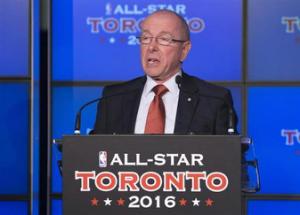The Toronto Raptors franchise is worth $980 million, according to the latest estimates from Forbes, up $60M from 2015.
(Note: My assumption is that this is American dollars, as Forbes makes no mention otherwise and the Raptors are the lone Canadian team in the league.)
Forbes releases a list of estimated franchise values annually, and while they have to be taken with a grain of salt and haven’t proven entirely accurate for recent franchise sales. As an example, Forbes’ recent valuations of the Raptors and Maple Leafs together far surpass the actual equity of MLSE and its recent valuation based on the 2011 sale, and that’s ignoring the rest of the MLSE properties (it’s possible MLSE has just appreciated a great deal since). Still, it’s a good rough gauge on how a franchise is appreciating. The Raptors rank 14th in the NBA with that valuation, a rounding error from making half the league’s teams worth $1 billion (Portland weighs in at $975M). As a frame of reference for where NBA teams stand, the Knicks ($3B) trail only the Cowboys, Patriots, and Yankees across U.S. sports franchises.
With the NBA’s enormous new national television contract kicking in for the 2016-17 season and helping further line the pockets of teams (plus the new $1B Nike deal), and given the exorbitant prices the last few NBA properties have sold for, it’s a good time to be in ownership. Franchise values are up 13 percent over a year ago, when they were up 74 percent from the year prior.
One interesting wrinkle for the Raptors comes in the form of local television rights deals. As the national TV contract explodes, many teams have seen or are trying to see resultant increases in their local rights deals. The Raptors are owned by Maple Leaf Sports & Entertainment, which is owned by Rogers Communications (37.5%), BCE (37.5%), and Kilmer Sports (Larry Tanenbaum, 25%). With the nation’s two primary sports television providers owning equal shares of the team, getting a gauge on whether the Raptors receive fair market value for their TV rights is impossible. Like with the Blue Jays, it can amount to an accounting decision of how much one hand feeds the other, and the “real” value of the Raptors in a sale would hinge on how the relationship with the previous owners (TV providers) would move forward.
MLSE is also going through a corporate restructuring that will move some assets to a holding company (MLSEP), further complicating things. Essentially, it’s impossible to know the actual value of the Raptors stripped from MLSE, Bell, and Rogers. (Maybe someone who has actually used their business degree in the last few years has a better idea of how to separate the synergistic parts of the organization for valuation, but I haven’t even had a coffee yet.)
One thing that could stand to decrease the short-term value of franchises is a potential work stoppage in 2017, though that impact may be difficult to value. It also seems unlikely to happen based on the current, encouraging rhetoric, and considering most franchise acquisitions are made with a long-term outlook, it probably wouldn’t move the needle much. The bigger complication may actually be how these soaring franchise values trickle back to players, a potentially contentious argument as the league surely won’t want to consider franchise appreciation as part of basketball-related income (and it probably shouldn’t be, but players will [rightly] argue that they’re contributing a great deal to increased real value in the league that isn’t accounted for by BRI).
H/T: Ball Don’t Lie



